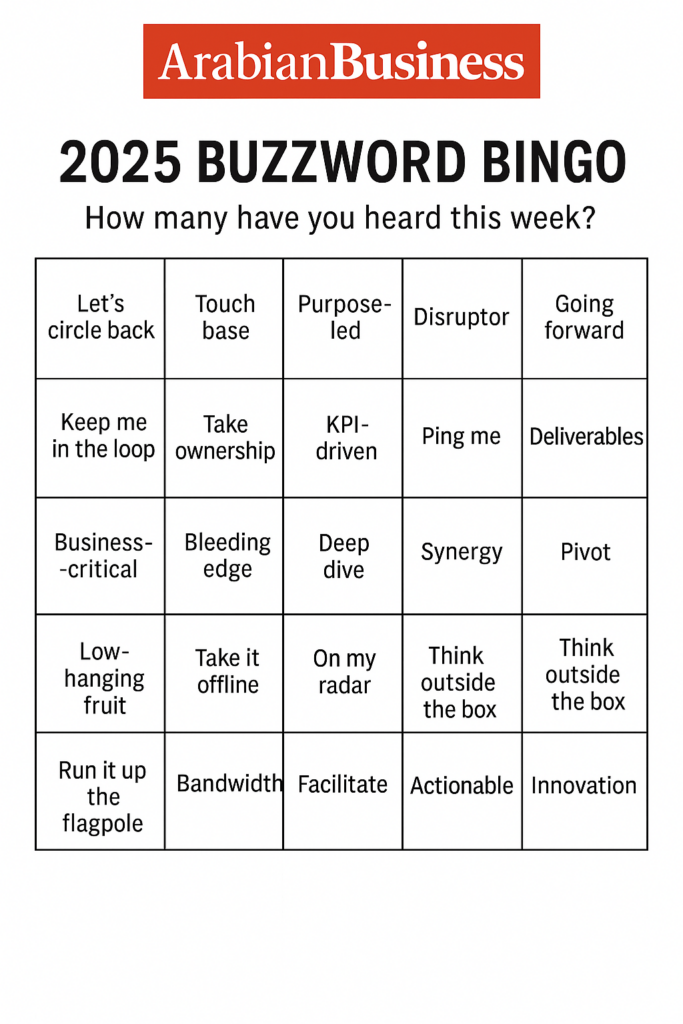Buzzwords and jargon now saturate modern workplaces
- Businesses don’t make money — they maximise revenue opportunities
- Managers don’t take a step back — they empower the team
- And employees no longer do their jobs — they strive toward a North Star metric aligned with corporate vision
Business Buzzword Bingo 2025
From “circle back” to “bleeding edge,” today’s office lingo promises clarity but delivers confusion. These phrases are meant to sound strategic, intelligent, or visionary — but most just obscure meaning, delay decisions, and drain meetings of momentum.
Leaders write them on slides, repeat them in meetings, and post them on LinkedIn hoping to sound like captains of industry. The reality? They’re more likely to leave colleagues — sorry, value-chain co-creators — weeping quietly into the photocopier tray.
Here are 25 of the worst offenders — decoded, dissected, and replaced with something that actually works.
Let’s circle back
Translation: Let’s return to this topic at a later date.
What it REALLY means: A polite way to delay, deflect, or forget about something without saying so directly. Usually means: “Let’s hope this dies quietly and we never mention it again.”
It is a polite way to say in a meeting “I don’t want to hear another word about this”.
What to say instead: “Let’s revisit this after Thursday’s meeting.”
Touch base
Translation: Let’s catch up briefly.
What it REALLY means: Used when someone wants to appear proactive without saying anything specific. It’s vague, empty, and screams filler. You can go for decades in a successful business career without touching a single base – whatever that means.
What to say instead: “Let’s have a quick five-minute call tomorrow.”
Purpose-led
Translation: This business is guided by a meaningful mission.
What it REALLY means: An overused label slapped on everything from bottled water to crypto tokens. If you have to say it, you’re probably not showing it.
Is it cynical to suggest this is way of charging an extra $3 for an ice cream by pretending the company is actually in the business of bettering society and not just flogging frozen desserts.
What to say instead: “We’re focused on solving [specific issue] with measurable impact.”
Disruptor
Translation: A company that changes the status quo.
What it REALLY means: Once reserved for revolutionary innovations — now applied to every startup with a pitch deck and Wi-Fi. Can you really be a real estate disruptor if all you’re doing is selling homes to existing customers using conventional methods? It usually means annoying, troublesome or just plain belligerent.
What to say instead: “We’re doing [X] differently, and here’s the result.”
Going forward
Translation: From this point on.
What it REALLY means: As opposed to what? Jumping in a time machine and conducting business in the past? This passive-aggressive reset is often used to avoid owning a mistake: “Ignore what just happened — here’s the new spin.”
What to say instead: “From now on, we’ll do it this way.”
Keep me in the loop
Translation: Update me as things progress.
What it REALLY means: A vague request for updates — often thrown in by someone who doesn’t want to be responsible but wants to stay attached.
Roughly translated it means “I am offering no help, support or advice on how to fix this, but if you update me I will swoop in at the end and take credit or be there first-hand to offer criticism when this whole fiasco comes to an end”.
What to say instead: “Please send me a status update every Friday.”
Take ownership
Translation: Be responsible for this task.
What it REALLY means: A favourite of managers outsourcing accountability. Sounds empowering but often means: “This is your problem now.”
What to say instead: “You’re responsible for delivering this by Friday.”
KPI-driven
Translation: Focused on hitting performance targets.
What it REALLY means: A phrase that tries to sound results-oriented but often replaces real strategy with a spreadsheet. Often it means just breaking up a job description into a bullet-pointed list of startlingly obvious duties.
What to say instead: “We’re measuring success by [specific outcome].”
Ping me
Translation: Send me a message.
What it REALLY means: Tech-bro casualness in professional clothing. Makes email sound like a video game.
What to say instead: “Send me a message.”
Deliverables
Translation: The items we’re expected to complete.
What it REALLY means: Cold, dehumanised project language that treats work like a transaction — not a process. Deliverables just means what you were told to do, but it can take the heart and passion out of a commodity.
Yes, a beautiful painting, an artisan hand-made suit or a finely tuned algorithm are all deliverables of some sort or other – but it does make hard work sound like a faceless item on a spreadsheet.
What to say instead: “Here’s what we need to complete by next week.”

Business-critical
Translation: This is essential to the company’s operations.
What it REALLY means: Inflationary language that makes everything sound like a life-or-death decision. Often just means “important.”
What to say instead: “This is top priority for the business.”
Bleeding edge
Translation: Extremely advanced and experimental.
What it REALLY means: Used to sell half-baked tech no one understands. Sounds impressive, delivers chaos. Even more modern than cutting edge and, presumably, an evolutionary step towards “bone-deep edge”. What is wrong with just calling something “new”?
What to say instead: “We’re testing new technology before wide rollout.”
Deep dive
Translation: A detailed analysis.
What it REALLY means: A signal that a 90-slide deck is coming. Or worse, an hour-long meeting that should have been an email. There is no shame in being thorough and checking work properly – you don’t need to make it sound like an extreme sport expedition to make it more glamorous.
What to say instead: “Let’s analyse this thoroughly.”
Synergy
Translation: Two things working better together.
What it REALLY means: It has become so overused that nobody even knows any more. Often said in meetings by somebody who wants you to do their work for them, the actual definition is unknown. Most likely said by people in HR, marketing or head office when they want other departments to do them a favour.
What to say instead: “There’s mutual benefit if we align on this.”
Pivot
Translation: We’re changing direction.
What it REALLY means: The startup world’s polite way of saying, “Our idea failed, and we’re scrambling.” There is no shame in pivoting, but you should only say it if you actually mean it.
What to say instead: “We’re shifting strategy based on what we’ve learned.”
Low-hanging fruit
Translation: The easiest opportunity to pursue.
What it REALLY means: Dismisses real work as too difficult and suggests we’ll only go for easy wins. Said by other people in the office to undermine your achievements.
Under no circumstances should you ever take fruit into a meeting and start flinging it at people who use business jargon, but silently thinking of bouncing a mango off your manager’s head when they belittle your achievements is permissible.
What to say instead: “Let’s start with the fastest and most impactful tasks.”
Take it offline
Translation: Discuss this outside the meeting.
What it REALLY means: Usually code for: “This is awkward or unimportant — let’s bury it later.” If not that then it is a certain way to say “We will criticise everybody else in this meeting when we get together later”.
What to say instead: “Let’s discuss this one-on-one after the meeting.”
On my radar
Translation: I’m aware of this.
What it REALLY means: A vague, non-committal way of saying, “I haven’t done anything yet, but I want credit for noticing it.”
What to say instead: “I’m tracking this and will update you next week.”
Game-changer
Translation: A breakthrough innovation.
What it REALLY means: One of the most overhyped phrases in business. If everything’s a game-changer, nothing is. Cars, sales people, soft drinks, running shoes, logos, mobile phone cases, fast food restaurants and office layouts get called things like game-changing on a daily basis.
Ask yourself if they are even one per cent different to everything else in the same category. They probably are not.
What to say instead: “This could have a major impact on results.”
Think outside the box
Translation: Be creative.
What it REALLY means: Ironically uncreative. Used most often by people who don’t actually want change.
What to say instead: “Let’s question our assumptions and explore new options.”
Run it up the flagpole
Translation: Let’s get approval or feedback.
What it REALLY means: A relic of 1950s corporate speak that now signals indecision or hierarchy worship. Usually said by people in middle management who do not have the power to make a decision, but also don’t have to do the work after one has been made.
What to say instead: “I’ll check with the decision-makers and confirm.”
Bandwidth
Translation: Availability or capacity.
What it REALLY means: Corporate code for burnout or overwork — used to politely say “I can’t take this on.” It very rarely refers to actual bandwidth. More likely to suggest “I was hoping to leave at 3.30pm today to go to the mall, so don’t want to do anything else”.
What to say instead: “I don’t have capacity right now — can we push this?”
Facilitate
Translation: Help make something happen.
What it REALLY means: A vague verb that makes action sound bureaucratic. Overused in job descriptions and strategy decks.
What to say instead: “I’ll help organise and move this forward.”
Actionable
Translation: Something we can act on.
What it REALLY means: A favourite in reports and slides — often used when there’s little clarity about the action itself.
What to say instead: “Here’s what we can do next.”
Innovation
Translation: New and valuable ideas or products.
What it REALLY means: The most overused word in modern business. If you have to say it, you probably haven’t done it.
What to say instead: “Here’s the new solution we’re building.”
Corporate jargon decoded
If the goal is clear, honest communication, let’s start by dropping the buzzwords. They don’t make you sound smarter — just less direct.
Retiring these phrases won’t just clean up your meetings and emails — it’ll make your team faster, sharper, and easier to trust.
Print out the bingo card below and take it into your next meeting.



